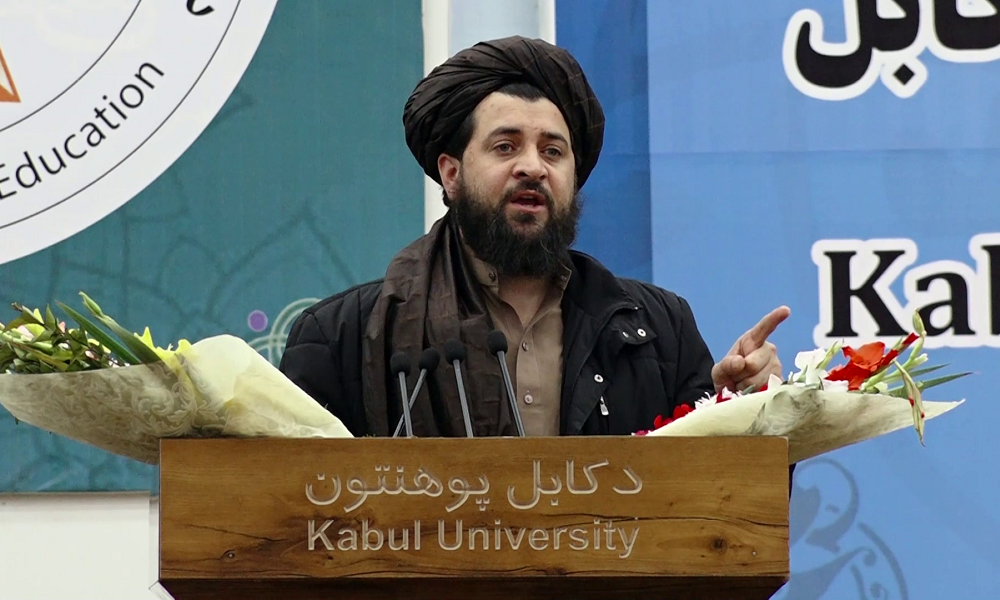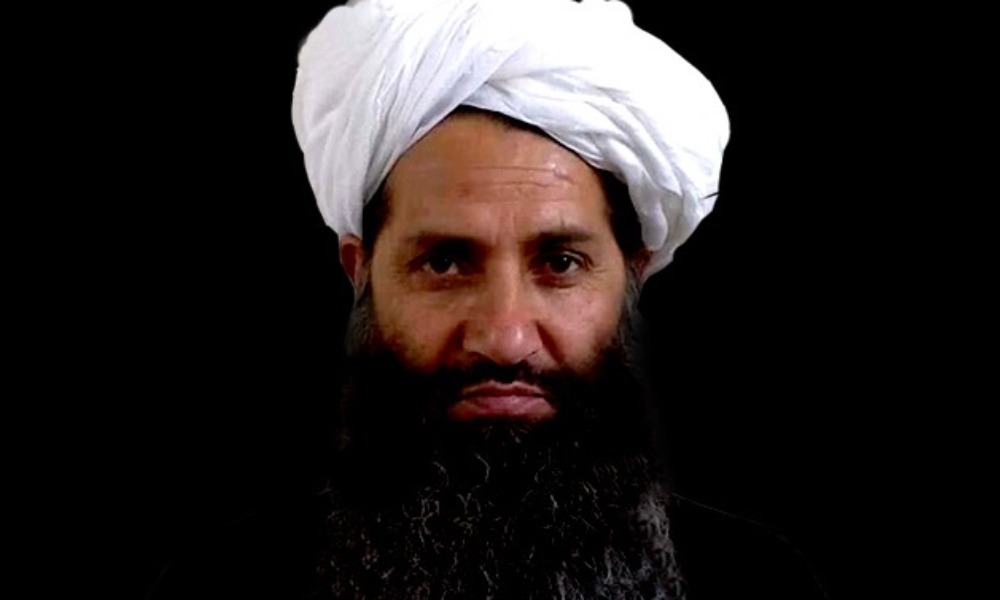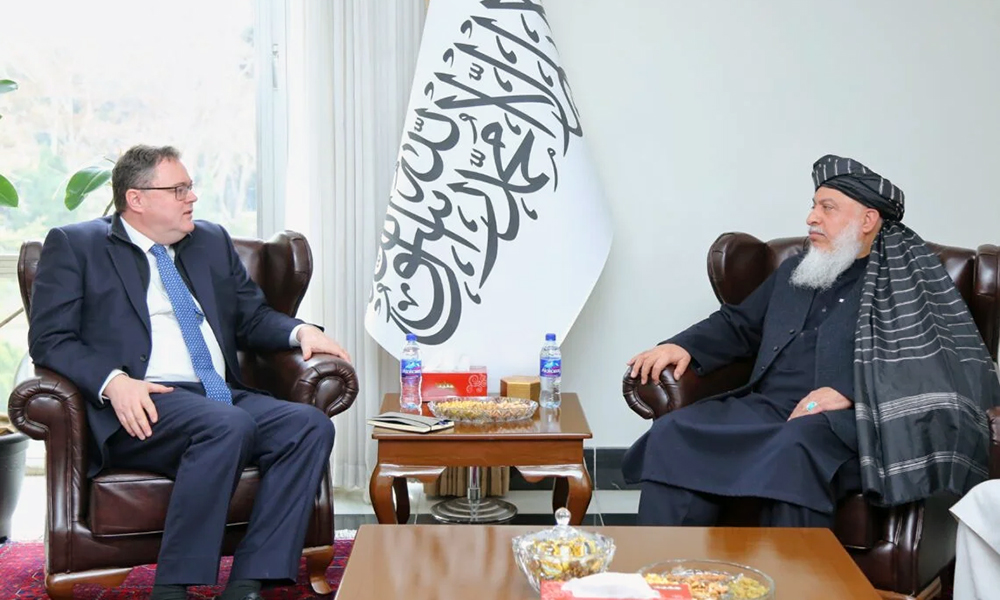Latest News
Yaqoob Mujahid says no basic development was carried out over 20 years

Acting Minister of National Defense Mohammad Yaqoob Mujahid said Thursday that no fundamental development was carried out in Afghanistan over the 20 years under the republic system.
Speaking at the graduation ceremony of Kabul University students, Yaqoob Mujahid said that infrastructure built by the US in that time was temporary and for their use only.
He said however that Afghanistan needs qualified and experienced professionals across many sectors in order to progress.
“If there are no doctors, engineers, pilots, mullahs, scholars... in the country, this country will not progress,” he stressed.
Acting Minister of Interior Affairs Sirajuddin Haqqani also said that over the past five decades, the policy of destruction by colonial countries was implemented in Afghanistan, which led to it becoming difficult to forge unity among the people.
“If you think that destructive policies have been implemented in Afghanistan in the last half century; when one system becomes dominant, another system is placed against it,” said Haqqani.
He added that universities should stay out of politics and focus on science and knowledge because the enemies of Afghanistan want to control the universities first.
He stressed that the Islamic Emirate and himself respect science and knowledge and that "their jihad was not against the country but for its freedom."
Acting Minister of Higher Education Neda Mohammad Nadim also spoke at the ceremony and said the IEA is committed to the development and advancement of education in the country.
Nadim stated that even though foreigners say they want to see development in Afghanistan, it's not really what they want.
He added that the IEA “is committed to the development of higher education in the country and has done important work in this field."
This year, 2,500 students graduated from Kabul University from 70 departments.
Latest News
Human traffickers should be sentenced to 1 to 3 years in prison: IEA leader

The Leader of the Islamic Emirate has issued a decree instructing the Ministry of Interior Affairs to prevent human trafficking and to arrest and refer culprits to military courts.
The decree containing six articles says that that military courts should sentence human traffickers to one year in prison for the first time, two years if repeated for the second time and three years if repeated for the third time.
The ministries of Hajj, information, telecommunications, borders, propagation of virtue, as well as religious scholars are asked to inform the public about the dangers and adverse consequences of travelling through smuggling routes.
The decree comes as the rate of migration has increased following the political change in Afghanistan in 2021.
Latest News
Eight Afghan migrants die as boat capsizes off Greek island

Eight Afghan migrants died after a speedboat carrying migrants capsized off Greece's eastern island of Rhodes on Friday, the Associated Press reported.
Greek authorities said that the capsizing was the result of the boat’s maneuvering to evade a patrol vessel.
A total of 18 migrants — 12 men, three women and three minors — all Afghan nationals, were rescued, Greece's coast guard said Saturday. The dead were also from Afghanistan, it said.
Some migrants remained hospitalized, with one in critical condition, authorities said.
Two Turkish citizens, ages 23 and 19, were arrested as the suspected traffickers. The boat sank after capsizing, the coast guard said.
The sinking off Rhodes was the second deadly incident involving migrants in the past week.
Seven migrants were killed and dozens were believed missing after a boat partially sank south of the island of Crete over the weekend — one of four rescue operations during which more than 200 migrants were rescued.
Latest News
Norwegian Chargé d’Affaires meets with IEA deputy foreign minister
Welcoming the diplomat’s visit to Kabul, Stanikzai underscored the importance of political relations between Afghanistan and Norway, the foreign ministry said in a statement.

The Norwegian Chargé d’Affaires for Afghanistan, Per Albert Ilsaas, on Saturday met with IEA’s Deputy Foreign Minister for Political Affairs, Sher Muhammad Abbas Stanikzai, in Kabul.
Welcoming the diplomat’s visit to Kabul, Stanikzai underscored the importance of political relations between Afghanistan and Norway, the foreign ministry said in a statement.
In addition to focusing on bilateral political, humanitarian, and other pertinent issues, the two sides expressed hope that continued engagement would lead to constructive solutions to related issues.
This comes two weeks after the Foreign Ministry Spokesman Abdul Qahar Balkhi expressed disappointment regarding the decision by the Norwegian government to downgrade diplomatic relations with Afghanistan.
Balkhi said in a post on X that such decisions should not be linked with internal affairs of other countries.
“Diplomatic engagement is most effective when it fosters mutual understanding and respect, even amidst differing viewpoints,” he stated.
“Access to consular services is a fundamental right of all nationals. We strongly urge all parties to prioritize this principle in the spirit of international cooperation,” he added.
-

 Sport5 days ago
Sport5 days agoZimbabwe’s opening ODI against Afghanistan abandoned
-

 World4 days ago
World4 days agoNorth Korean troops suffer 100 deaths, struggling in drone warfare, South Korea says
-

 Latest News2 days ago
Latest News2 days agoAfghan men must stand with women to support viable future of country: US envoy
-

 Latest News4 days ago
Latest News4 days agoTwo horror accidents on Kabul-Kandahar highway leave 52 dead
-

 Sport3 days ago
Sport3 days agoAfghanistan crush Zimbabwe by 232 runs in second ODI
-

 Regional5 days ago
Regional5 days agoIran’s president to make rare visit to Egypt for D-8 summit
-

 International Sports4 days ago
International Sports4 days agoLanka T10: Kandy Bolts in at 4th spot in playoffs after thrilling day
-

 World5 days ago
World5 days agoNATO takes over coordination of military aid to Kyiv from US, source says
























